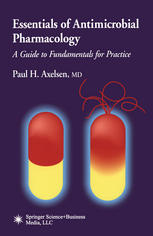

Most ebook files are in PDF format, so you can easily read them using various software such as Foxit Reader or directly on the Google Chrome browser.
Some ebook files are released by publishers in other formats such as .awz, .mobi, .epub, .fb2, etc. You may need to install specific software to read these formats on mobile/PC, such as Calibre.
Please read the tutorial at this link: https://ebookbell.com/faq
We offer FREE conversion to the popular formats you request; however, this may take some time. Therefore, right after payment, please email us, and we will try to provide the service as quickly as possible.
For some exceptional file formats or broken links (if any), please refrain from opening any disputes. Instead, email us first, and we will try to assist within a maximum of 6 hours.
EbookBell Team

4.0
86 reviewsFor many medical students and physicians, the task of quickly obtaining sufficient, accurate, and up-to-date information about the pharmacology of antimicrobials often involves consulting either lengthy textbooks or inadequate tabular guides. In Essentials of Antimicrobial Pharmacology: A Guide to Fundamentals for Practice, Dr. Axelsen superbly addresses this problem by concisely summarizing the essential medical data concerning the leading antimicrobials used in fighting infectious diseases and clearly illustrating their mechanisms of action. The agents described range from antibacterial and antifungal to antiparasitic and antiviral agents, and include immunomodulators and immunizing agents. For each drug discussed, the book allows rapid access to the essential facts concerning its structure and mechanism of action, the spectrum of its activity, its pharmacokinetics, its adverse effects, and its resistance. Background discussions explain the fundamentals of measuring antibiotic effect, administering antibiotics, distribution and elimination, sensitivity testing, and dose-response relationships.
Essentials of Antimicrobial Pharmacology: A Guide to Fundamentals for Practice provides medical students, physicians, and allied health professionals with rapid access to the core principles of antimicrobial pharmacology, and a foundation for decisions about the use of antimicrobials in daily practice.